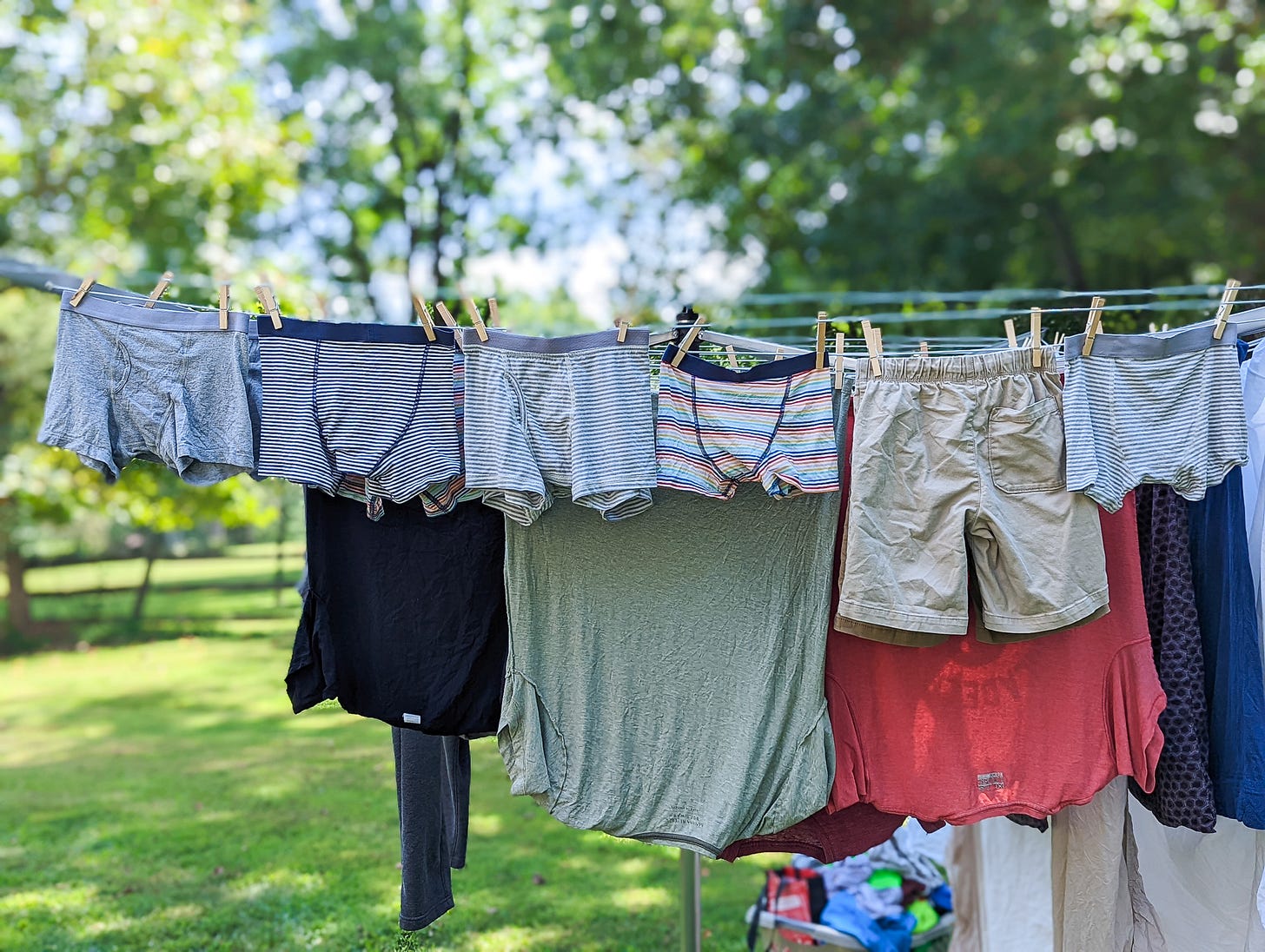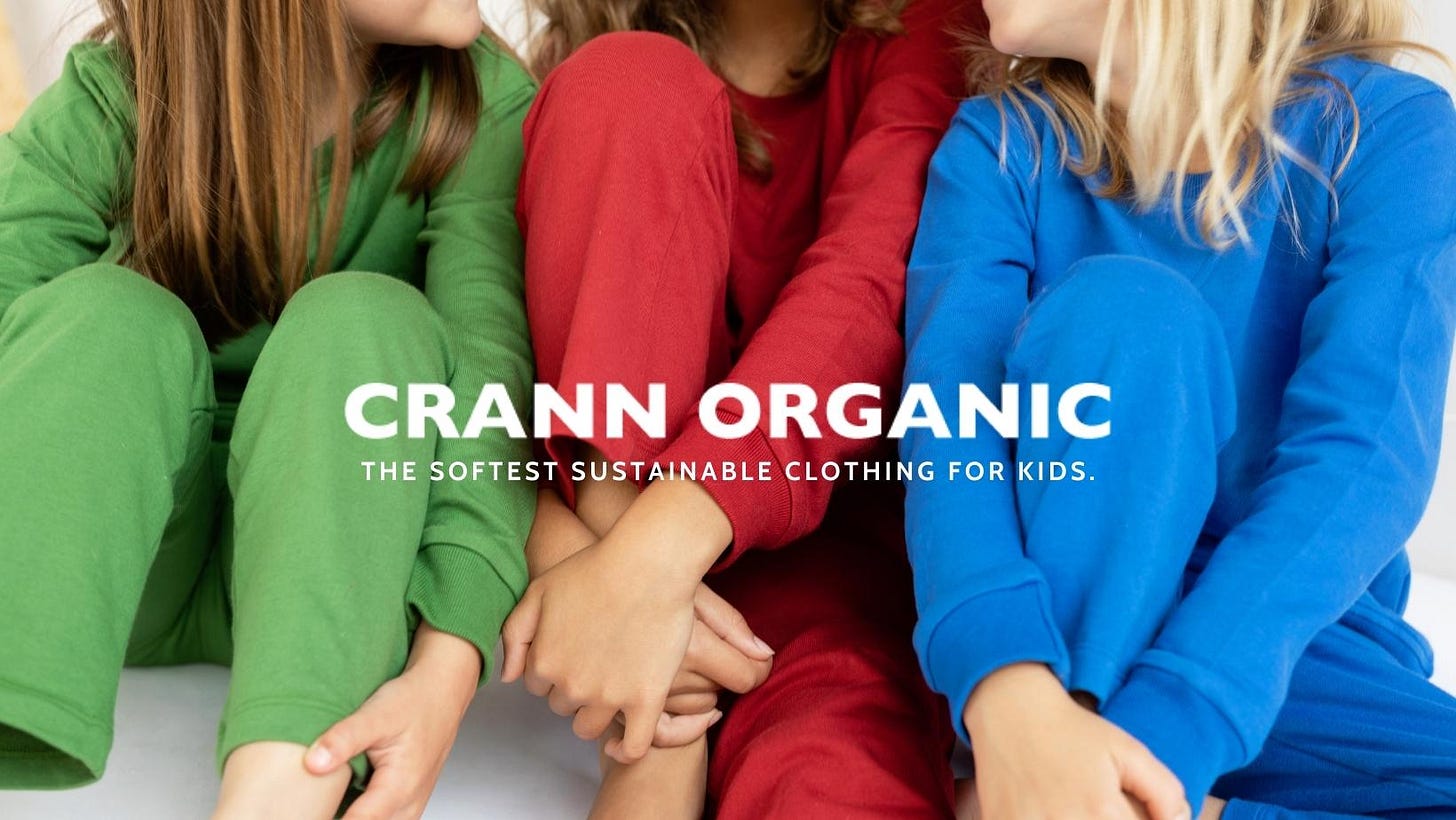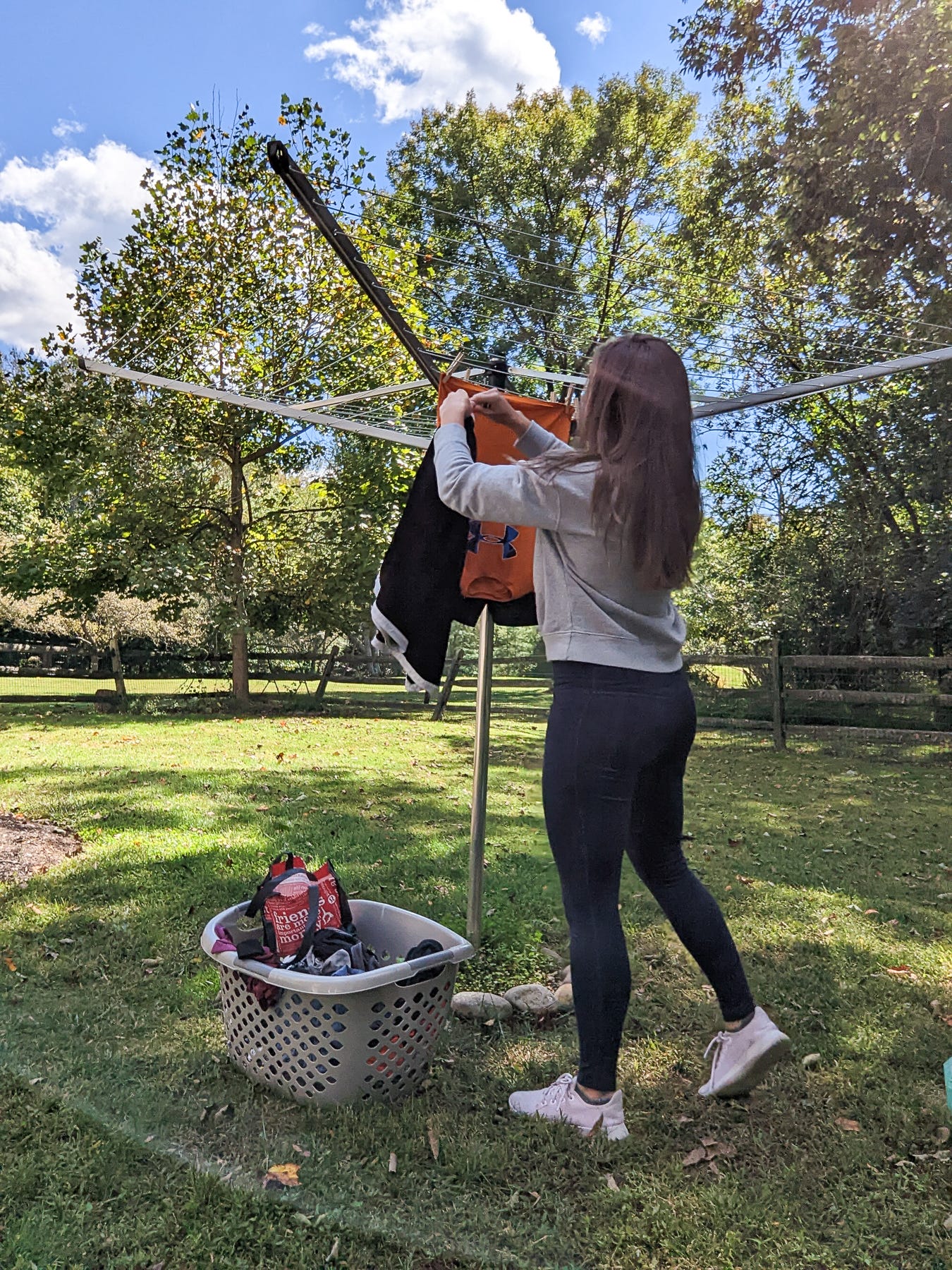issue #10: i'm d(r)ying to know...
👀 is that your underwear I see on your clothesline? 🩲
Turtles don’t want your microplastics. HOA restrictions on clotheslines are dumb and uniquely American. Let’s crowdsource some comebacks for that cringe. I challenge you to fall in love with line-drying clothes. And what if you tried to die with zero dollars in your bank account?
Today is…
World Turtle Day
If protecting our planet had a mascot, it might be the sea turtle. So many people (especially kids) come into the environmental space through a desire to protect turtles and tortoises.
Did you know that unhatched turtle eggs are an important source of nutrients for vegetation that grows in dunes, and that vegetation helps prevent erosion of the sand? So turtles are protecting our precious beaches! Rapidly rising ocean temperatures and acidification due to climate change degrade the habitat of sea turtles, making it harder for them to find food, reproduce, and survive.
World Turtle Day is a great day to learn more about how climate change impacts sea turtles and use it as a relatable microcosm to understand how something abstract like climate change impacts so many tangible aspects of a creature’s life (food, water, chemicals, nesting grounds, etc…). Here’s a fun little teaching tool from the World Wildlife Federation to learn more about sea turtles and some turtle coloring pages for the kids (or adults, no one is judging)!
sustainable spotlight
I’ve been a fan of Crann Organic** for years. My boys love their boxers because they are super soft and comfy. They’re so popular Crann can’t keep them in stock. 🙃 The entire collection is made from organic fabrics that are great for kids.
Crann outgrew its current warehouse space and is ready to move up in the world. To celebrate (and to make the move a little easier), they’re currently doing a BOGO sale on all their summer essentials. Use code BOGO when you checkout to get it!
If you’ve got kids who need something new for summer, head over and check it out. Your kids will love how soft everything is! You might even be jealous that they don’t make their gear in adult sizes.
airing out the dirty laundry
When I learned about entropy in science class in high school, never in my wildest dreams did I anticipate that its most relevant application in my life would show up in the sphere of housework, specifically laundry.
No worries if you forgot what entropy is. I don't remember much about high school, so I get it. Somehow entropy, a gradual decline into disorder that requires energy being added to the system to keep it in order, is the thing that sticks for me.🤷🏻♀️
Such is the case with laundry. Laundry requires endless energy to keep from falling into complete disarray.
Without continuous energy added to the laundry equation, it becomes sheer chaos. When we teach students about entropy, we should ask them to do the laundry in their homes for a week. They'll master this principle in no time.
Not only does laundry feel neverending, but why are their dirty clothes in the hamper 17 seconds after I put the last load of laundry in the washer?! And how do the people in my house generate so much dirty laundry?! There must be extra humans putting dirty clothes in our laundry baskets.
sustainable laundry habits are hot
Likely due to its outsized allocation of our time and its tangential relationship to one of our favorite consumption pastimes - shopping - laundry is ripe for sustainable swaps and adjustments. I get quite a few questions about sustainable laundry detergents, line-drying clothes, and general tips to make laundry less taxing on the planet.
It's a category of questions I'm always happy to entertain because sustainable laundry habits are typically less stressful than more conventional practices. And I enjoy them! I mean, it’s all relative. I don't love doing laundry (who does…). But I appreciate the more sustainable alternatives to a mundane chore that's in my life whether I like it or not. For example:
Washing clothes less often helps fabrics last longer, uses less water, energy, and cleaning products, and saves us the time and hassle of doing so many loads of laundry. Less laundry sounds pretty great!
Line-drying clothes avoids the use of the dryer, one of the most energy-intensive appliances in the home. Skipping the dryer is better for the clothes and saves money by not paying energy bills to run it as often. It's also pretty nice to spend a few minutes outdoors in exchange for laundry that smells like fresh air. Hiding out for five minutes of alone time between clotheslines instead of in the bathroom? Count me in!
Detergent sheets are much easier to carry and store than bulky plastic jugs filled with messy, liquid detergent. Who wants to lug those things home from the store anyway?!
if it's so great, why isn't everyone doing it
My glorification of sustainable laundry habits begs the question: if it's so great, why aren't more people doing it? There are many reasons, most of which come down to cost, convenience, chemicals, and consumerism.
cost
There’s a perception that it’s less expensive, but cost efficiencies are up for debate and intersect with convenience. Using washing and drying machines with store-bought detergent and accessories is not the most cost-effective way to clean our clothes.
hand wash and air dry anyone? less expensive but no thanks.
There are trade-offs for convenience, and it's silly to suggest we return to fully manual clothes cleaning in our mainstream society even if it’s less expensive. Don't worry. I won't pretend this is the future of housework (even if tradwife friends think homemaker tasks are when life really begins... 🙄). The Benedictine nuns know that's nonsense. 🙏🏻
conventional detergents (sans accessories) < sustainable detergents
Generic brand liquid detergents can be less expensive than more sustainable alternatives like powder, PVA pods, and detergent sheets. But no one can argue that using extra products like dryer sheets and scent boosters is less expensive than skipping them, so I think the sustainable alternative to avoid them is a win-win.
air drying < clothes dryer
Air drying clothes is significantly less expensive than purchasing and running a clothes dryer (even for those who buy a clothesline and a dryer, and use each as it makes sense). Clotheslines are pretty affordable, so you can see a return on investment in a reasonable amount of time. We can also save money using the dryer during off-peak periods when time-of-use energy rates are available.
In short, most sustainable laundry habits are less expensive, though it can be hard to find eco-friendly detergent options as cheap as conventional options.
convenience
Convenience is king (in theory). But on further examination, that’s not how we often live. We prioritize all sorts of inconvenient things for meaningful motives. Every parent knows we do wildly inconvenient things for our kids (youth sports, anyone?) for reasons many of us can't intellectually justify.
Imagine if we did mildly inconvenient things for ourselves, like spend ten minutes in sunny solitude hanging clothes on a clothesline instead of scrolling social media while hiding out in the bathroom. Parents. I know you know. It’s a little win but something we could probably make time for.
And is washing, drying, and folding every article of clothing each time we wear it really that convenient? If it passes the smell test, put it in the limbo pile and give it another go until it’s smelly. Washing less often is a win-win.
chemicals
Thanks in large part to corporate consumer products companies, we've been trained to associate chemical fragrances in detergents with cleanliness. I ditched strong-smelling laundry detergents years ago. Yet I still appreciate a deep inhale through the detergent aisle at Target, despite knowing that most of those chemicals are not so great for my body, my skin, and my endocrine system.
Fibers like cotton, wool, and even synthetic alternatives like polyester don't have a scent. So theoretically, clean clothes shouldn't smell like much. It’s silly that we've come to relish in the fake "fresh linen" and synthetic "spring rain" scents of chemicals entirely unrelated to fresh air, clean linen, or real spring rain. But that's where we're at.
In her book To Dye For, Alden Wicker sniffs out the truth about chemical sensitivity, endocrine disruptors, and the growing body of science questioning the health impacts of smelly chemicals in our clothes. As you might guess, it's not all lavender and lilies.
Maybe we should reconsider if we need to spend money on laundry accessories that add questionable chemicals to our clothes and create more waste. This trick that costs less than $1 works for me every time.
consumerism
Our Mad Men drinking buddies and their protegés convinced us that we need to wash our clothes after every wear (what a racket), machine loads are more socially acceptable than line drying (oh please), and more product equates to more cleanliness. We've been duped. But the multi-billion dollar market caps of companies like Procter & Gamble and Unilever tell us their campaigns have been a smashing success.
Our marketing bros and bras hung natural air drying out to dry so effectively that many homeowners associations and municipalities legally prohibit it. One can't be serious that my removable rotary line dryer** standing in my backyard diminishes my neighbors' property values. What a joke, particularly because any devaluation reflects cultural perceptions and has zero impact on another person's lived experiences.
so what to do about it?
There are many ways to make your laundry habits more sustainable, some small and some more substantial.
simple starter steps
You can:
use dryer balls** so loads dry faster in your dryer
wash on cold water to reduce the energy used to heat the water
wash clothes less often
choose more sustainable detergent options
opt for products without plastic packaging
hang dry clothes
Here are 5 simple steps for low-waste laundry and a few easy tips to make your laundry room more sustainable.
choose better energy sources
Switch to time-of-use energy (if you can), and wash and dry clothes outside of peak hours. Did you know TOU rates flatten the energy consumption load for your utility and can reduce reliance on dirty power plants (called peakers)? Check out the details here. It's good for your budget, and it's good for the planet. I feel like I say that every week...
the best energy source is free
Sun and fresh air are free. Install a clothesline and give it a shot. I’ve answered a bunch of questions here. I have a rotary clothesline, but many types will work. You could install a retractable clothesline, one that hangs from your ceiling, or even just a wire between two strong trees. If I missed anything about air drying your clothes, leave a comment below and I’ll do my best to answer!
As for the clothesline, don't knock it 'til you try it, and don't commit to perfection. That's not the point. Your kids can help you. Use your dryer when it rains. You can air dry in winter (here are tips to make it more effective). And you can use your dryer when you need it.
I dare you to tell me that the ten minutes of alone time you currently steal scrolling in your bathroom is not better spent outside squeezing clothespins, even when the weather is a little less than perfect. Swap your toilet time for fresh air and a clean load of leggings and sports bras. So. much. better.
ditch the dodgy detergents
Last but not least, consider more eco-friendly and lower-waste detergents. Laundry strips are my favorite because they’re light, small, and easy to use. I prefer Tru Earth (though I haven’t used all the brands of detergent strips). Here’s a detailed review of Tru Earth detergent strips, including the details on the PVA (i.e. plastic film used in the products).
Because I try a lot of brands before I write about them, I have used Tru Earth strips, Meliora powder, Blueland tablets**, The Laundress detergent**, Active Wear powder**, and Dropps pods**. I don't like the Dropps laundry detergent pods because the packets don’t always dissolve in my washer (though I use and like the dishwasher detergent pods**). But all the other laundry detergents I mentioned above work well for me. The TruEarth strips have the lowest transportation environmental impact because they are so small and light.
There’s been some hubbub around the sustainability of PVA in laundry sheets and pods. PVA is a plastic compound, so some argue that the PVA in laundry strips leaves behind microplastics that contaminate our waterways. The turtles are unimpressed. Others say the PVA breaks down sufficiently so that microplastics are not an issue.
The research condemning PVA (also called PVOH) is funded by a competitor of brands that use PVA in their products, so there’s definitely a conflict of interest. That doesn’t mean the research is wrong, but it needs a more thorough review and consideration.
Alden Wicker, a trusted journalist in the sustainable fashion space, took a deep dive into this conversation and shared her thoughts on whether we should be concerned about PVA in sustainable products or if the critique is more marketing and bullying than good science.
a lot about laundry
Whew. That was a lot about laundry, and we’re not even halfway through the wash cycle. It’s no wonder many of us get cross-eyed when we try to make more sustainable choices in our homes, especially when the science of sustainable swaps is debatable.
Don’t let my ramblings send you astray. Start somewhere and do your best. I often equate it to picking the low-hanging fruit on the tree first. There’s no sense in climbing to the top of a tree to pick an orange when you can grab a handful of fresh citrus with your feet firmly on the ground.
When it comes to laundry, pick a new detergent to try. Create a “not quite dirty” basket to store things you’ve worn but don’t yet need to be washed. Thrift stores have tons of baskets and bins that are perfect for this type of collection.
Or buy that rotary line dryer** and test it out. Summer is heating up, so it’s the perfect time to prioritize a few minutes outside for peace, quiet, and pinning. I’m d(r)ying to know if you line-dry your clothes (sometimes or all the time) or if you would give it a try! Let me know!
Bonus points for any spunky comebacks for the neighbor who tells you your clothesline is cringe.
a few other eco things
Loved learning about this organization that helps get climate stories into Hollywood movies so we can normalize the narrative that climate change is real. Why are we still discussing this? I know why **Big Oil Lies** and I wonder how some of these people sleep at night with all the gaslighting they off-gas on the reg.
Do you know the chemical compound for the PVA in those Tru Earth Eco-strips? She does!
Best (no) shopping list ever from Stephanie? What would you add?
Wearing these** as I write, and I’m a fan. They’re currently 25% off!
just because
Read Die with Zero: Getting All You Can from Your Money and Your Life** by Bill Perkins yesterday. I listened on Spotify (it’s included for free in Spotify Premium). He has a really interesting take on how to spend our money before we die that’s contrary to a lot of “common wisdom.” Worth a read, and it’s pretty short.
Scheduling this! (I’m such a nerd and embracing every ounce of it.)
Lastly… the whole world has shared their two cents on a rich football player (who can afford for his wife not to work) telling female college graduates that finding value in a college degree is a "diabolical lie" because life doesn't start until you're a wife and mother. 🙄 That’s not a quote, but that’s the essence of what he implied that upset many people.
He's entitled to his opinion and the freedom to share it. But wow... so tone deaf to use that time and place to put women in their place in the kitchen. 😬 I grew up Catholic and attended a Catholic university. This message was NEVER part of our curriculum, spoken or implied. I'm glad the Benedictine nuns reinforced the value of women as wives, mothers, AND however they chose to serve the world, just like the Jesuits at my college taught us.
I think part of the reason this ridiculous and unpopular opinion drew such attention is because it’s currently receiving a lot of cultural and literal currency in politics. Some big billionaire bozos are putting big bucks behind minimizing women to the role of the housewife and usurping our independence. Let's not forget that the vast majority of humans know women are not second-class citizens, and evil can triumph much more easily when good folks do nothing. Let's not be the ones who do nothing and leave a void for this garbage to creep into mainstream culture.
weekly mini eco challenge
Try one new thing to make your laundry habits more sustainable. Just one! You can do it!! What do you have to lose?
Try washing with cold water. Use wool dryer balls to help your clothes in your dryer get dry faster. Air dry one load of laundry on your drying rack. Or… if you’re feeling adventurous, buy a rotary line-dryer (or another type of clothesline). I sound like a broken record, but you might like it! 🌞
Until next time, I hope you’re having the best week available to you. Don’t hesitate to comment or leave questions. I love hearing from you all.
Jen
** These are affiliate links. They have no impact on your purchase. Thanks for supporting the newsletter!
💛 DID YOU KNOW that if you hit the HEART at the top or bottom of this newsletter, it makes it easier for people to find Sage Neighbor (and totally makes my day)? TIA 💛
Jen Panaro is a self-proclaimed composting nerd and advocate for sustainable living for modern families. Through her writing, workshops, and podcast guesting, she helps others find ways to incorporate sustainability into their everyday lives more easily while appreciating the joy along the journey.
When she’s not writing and creating, she’s a serial library book borrower, a messy gardener, a composting tinkerer. She’s a wife and mom of two boys and spends a lot of time in hockey rinks and other sporting venues watching her boys tear it up for their teams.















Love this! Laundry is low-hanging fruit from a sustainability point of view. I have eliminated all single-use plastic from my laundry room and I hang my laundry to dry whenever possible. If the neighbours don’t like my clothesline, too bad! They can continue to complain about their electricity bills, then.
Ahh I love this time of year in the UK where the sun starts making an appearance. I find hanging the laundry out so therapeutic. It’s ten minutes of time where I can have peace and quiet, enjoy the fresh air and hear the birds sing whilst doing a monotonous chore that I’ve been stuck doing inside for the previous part of the year. I’m looking for some homemade laundry detergent recipes, so I can make something more eco but affordable. Do you know if any good ones? I have three children so I need something that actually works 😩